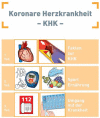Evaluating the efficacy of an education and treatment program for patients with coronary heart disease
- PMID: 25487763
- PMCID: PMC4261555
- DOI: 10.3238/arztebl.2014.0802
Evaluating the efficacy of an education and treatment program for patients with coronary heart disease
Abstract
Background: Until now, there has not been any evaluated, disease-specific education and treatment program for patients with coronary heart disease (CHD) in Germany. It is thought that education can improve these patients' physical activity and quality of life and teach them how to lessen their risk factors, what to do in case of an emergency, and how to assess their own medical treatment.
Methods: A randomized controlled open intervention trial was carried out from February 2010 to September 2011. 196 patients were assigned to receive the intervention (patient education), while 199 were assigned to a control group. In an intention-to-treat analysis, baseline and follow-up data were compared after a mean interval of 220 days. The evaluative instruments included the Freiburg Questionnaire of Physical Activity, the MacNew Heart Disease Quality of Life Questionnaire, questionnaires regarding knowledge about CHD, ergometric performance ability, and the body-mass index.
Results: The patients in the intervention group reported having increased their physical activity by a mean of 9.3 MET/week (MET=metabolic equivalent of task), compared to 2.5 MET/week in the control group; the difference of 6.8 MET/week was statistically significant (p = 0.015). The patients in the intervention group also rated their quality of life higher than those in the control group (0.2 ± 0.56 vs. 0.09 ± 0.53 [mean ± standard deviation], p = 0.056). They were significantly better informed than patients in the control group about risk factors and about what to do in an emergency.
Conclusion: Persistently unhealthy lifestyle is a common problem of CHD patients; the education and treatment program presented here may be a suitable means of improving patients' lifestyle for secondary prevention. Further studies will be needed to document long-term efficacy and to determine whether occasional refresher courses will be needed as well.
Figures



Comment in
-
Modifying Behaviors in Patients With Coronary Heart Disease.Dtsch Arztebl Int. 2015 Jun 26;112(26):459. doi: 10.3238/arztebl.2015.0459a. Dtsch Arztebl Int. 2015. PMID: 26205750 Free PMC article. No abstract available.
-
Evaluation Does Exist.Dtsch Arztebl Int. 2015 Jun 26;112(26):459. doi: 10.3238/arztebl.2015.0459b. Dtsch Arztebl Int. 2015. PMID: 26205751 Free PMC article. No abstract available.
-
In Reply.Dtsch Arztebl Int. 2015 Jun 26;112(26):460. doi: 10.3238/arztebl.2015.0460. Dtsch Arztebl Int. 2015. PMID: 26205752 Free PMC article. No abstract available.
References
-
- Robert Koch-Institut. Beiträge zur Gesundheitsberichterstattung des Bundes RKI. Berlin: 2012. Daten und Fakten: Ergebnisse der Studie „Gesundheit in Deutschland aktuell 2010“. www.destatis.de/DE/Publikationen/StatistischesJahrbuch/StatistischesJahr...; jjsessionid=C510B4F92C73B8068AE65441DA4D0FF8.cae3 (last accessed on 31 May 2014)
-
- Robert Koch-Institut. Gesundheit in Deutschland aktuell (GEDA) www.geda-studie.de/deutsch/ergebnisse/ergebnisse-nach-themen/chronische-.... (last accessed on 31 May 2014)
-
- Gesundheitsberichtserstattung des Bundes. Daten zu Herzinfarkten in der Region Augsburg. www.gbe-bund.de/gbe10/abrechnung.prc_abr_test_logon?p_uid=gastg&p_aid=&p.... (last accessed on 31 May 2014)
-
- ESC Press Office. EUROASPIRE IV reveals success and challenges in secondary prevention of CVD across Europe. www.escardio.org/about/press/press-releases/esc13-amsterdam/Pages/euroas.... (last accessed on 9 July 2014)
-
- Facharzt.de. Ungesunder Lebensstil mindert Therapieerfolge bei KHK-Patienten. www.facharzt.de/content/red.otx/191,137239,0.html. (last accessed on 5 January 2014)
Publication types
MeSH terms
LinkOut - more resources
Full Text Sources
Other Literature Sources
Medical
Miscellaneous

